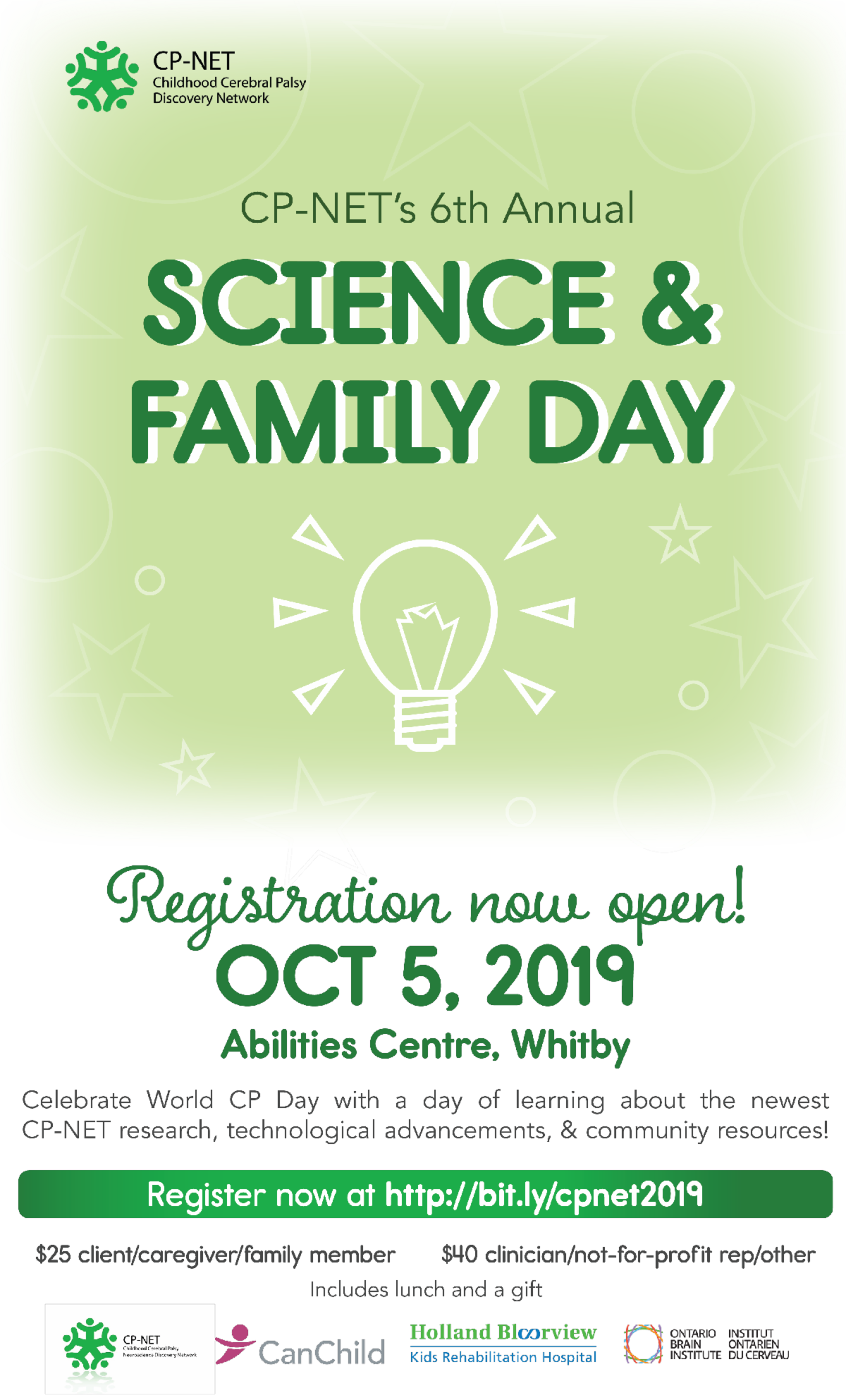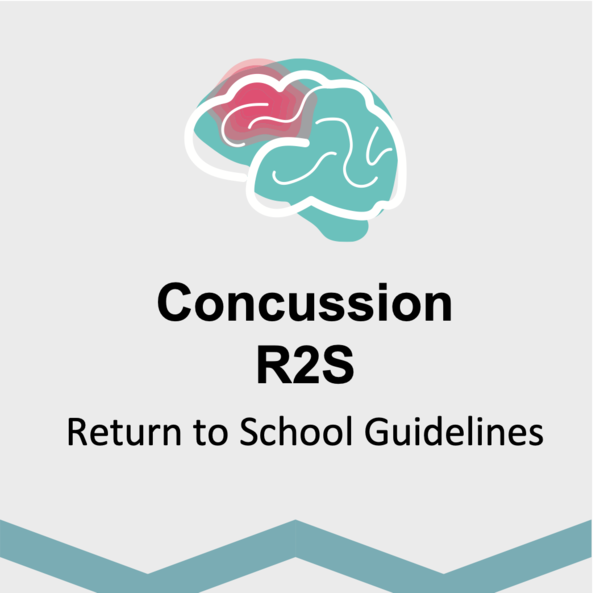|
Welcome to the Back to School edition of
CanChild Today! In this issue, we are excited to share event updates, feature resources, and
highlight publications by some of our
CanChild
members
!
2019 marks the 30th anniversary of CanChild -
use the hashtag
#CanChild30
on social media and celebrate with us!
Please feel free to share CanChild resources & newsletter with family, friends and colleagues.
They can subscribe to the
CanChild Today! Newsletter for free by registering
here
.
Our past issues are archived on the CanChild website and can be accessed here.
|
|
|

|
Celebrate World Cerebral Palsy Day with us at the 6th Annual CP-NET Science & Family Day! The event will b
e on
October 5th 2019
, from
10:00am
to
3:30pm
, at
Abilities Centre, Whitby, Ontario
.
CP-NET is excited to invite families, caregivers, clients, healthcare professionals, and researchers to join us on a day of learning about Cerebral Palsy (CP) research, innovation and community resources.
The day will include presentations, panel discussions and plenary sessions about the latest CP discoveries. All are welcome to attend! The topics will be presented in plain language with a family audience in mind. Check out our past event
here!
Network, have fun, and celebrate all that we can do together to improve the lives of children and youth living with CP and their families!
REGISTRATION IS NOW OPEN! HURRY, SPACE IS LIMITED!
|
|
 |
CanChild's Back to School Resources!
 |
Concussion: Return to School and Return to Activity
Guidelines Brochure
The Return to School and Return to Activity brochures guide children, parents, physicians, and community service providers in managing concussion. The resources include facts about concussion and a clear stage-by-stage plan for children and youth who experience post-concussion symptoms.
Click the links to download the Return to School and Return to Activity brochures for FREE!
|

|
Partnering for Change: Occupational Therapy Modules
The P4C: OT Modules are designed to assist occupational therapists (OT) who offer rehabilitation services in schools. The seven modules show how OTs can switch from a disability-focused model of rehabilitation service to the P4C Model, which focuses on the partnership among therapists, parents and educators to create an environment that improves participation, builds capacity, and develops self-management of children.
Read more about the P4C: OT Modules here! |
|
 |
New version of the GMFM App+!
 |
The GMFM App+ is now available for macOS on Apple computers! The new Single-User version can be installed on one device with one user account.
The GMFM App+ is a clinical tool designed and validated to evaluate the change in gross motor function in children with cerebral palsy. Features include:
- Ability to enter item scores for the GMFM-88, GMFM-66, GMFM Item Sets, and GMFM Basal and Ceiling
- GMFM-88 dimension and total scores
- GMFM-66 scores calculated using the GMAE-3, the most current version of the scoring algorithm
- Data displays including spider charts, item scores and Motor Growth Curves
- Access to the online tutorial
Visit the CanChild shop to learn more!
|
|
Recent Publications by CanChild Members!
|
Caregivers mostly focus on relationships and environment when facilitating child participation at home after a critical illness. Data from 180 participants suggest that strategies of caregivers include fostering supportive relationships (60%), modifying the child's environment (12%), assessing services (3%) and addressing the attitude of others at home (1%). In addition, providing clinically relevant knowledge and educating the caregivers are essential to ensure that they are equipped to support children after discharge from a Pediatric Intensive Care Unit.
Authors:
Jarvis JM,
Gurga AR,
Lim H,
Cameron J,
Gorter JW,
Choong K,
Khetani M.
Arch Phys Med Rehabil. 2019 July 3. doi:
10.1016/j.apmr.2019.05.034
|
The International Classification of Functioning, Disability and Health (ICF) is the health framework of the World Health Organization. The aim of this review is to determine how healthcare professionals use the ICF framework in setting goals when providing rehabilitation services for children. Results suggest that service providers (1) match goals to ICF domains, (2) implement ICF with existing tools for goal-setting, and (3) develop new tools for goal-setting based on the ICF. In general, the ICF Framework facilitates collaborative goal-setting between families and service providers.
Authors:
Nguyen L,
Cross A,
Rosenbaum P,
Gorter JW.
Disability and Rehabilitation
. 2019 July 25. doi:
10.1080/09638288.2019.1643419
|
This study published in
Journal of Child Psychology and Psychiatry explored the predictors of expressive language development in two cohorts of children with Autism Spectrum Disorder (ASD) and delayed language development. The results demonstrate an association between deficit in fine motor skills and long-term language impairment specifically in children with ASD and delayed language.
Authors:
Bal VH
,
Fok M
,
Lord C
,
Smith I
,
Mirenda P
,
Szatmari P
,
Vaillancourt T
,
Volden J
,
Waddell C
,
Zwaigenbaum L
,
Bennett T
,
Duku E
,
Elsabbagh M
,
Georgiades S
,
Ungar W
,
Zaidman-Zait A
. J Child Psychol Psychiatry. 2019 Aug 19. doi: 10.1111/jcpp.13117
|
|
 |
|
Canadian Anti-Spam Legislation
You are a member of the CanChild Today electronic newsletter generated by CanChild at McMaster University. If you believe that you should not be a recipient, you may withdraw your consent to receive these messages at any time, in accordance with Canadian Anti-Spam Legislation (CASL) and subject to McMaster University policy, by contacting the sender of this message, or by clicking on the 'SafeUnsubscribe' link at the bottom of this newsletter.
|
|
|
|
|
|